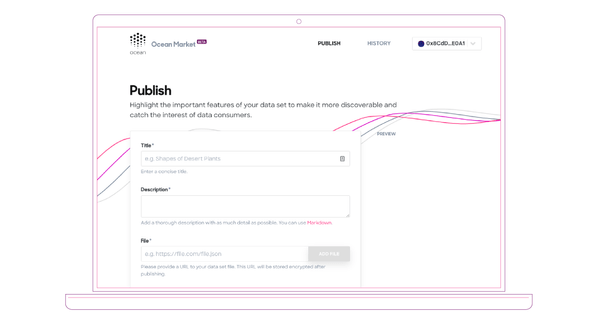Singapore, Tuesday, 27 October 2020 — Ocean Protocol, a decentralized data exchange protocol to unlock data for AI, announces the release of Ocean V3, featuring datatokens, Ocean Market and IDOs (Initial Data Offerings). Ocean V3 brings all the capabilities of data sharing in a Web3 native architecture that makes it easier for people to publish, auto-price, and sell their data.
The core component of Ocean V3 is the datatoken. Datatokens are ERC20 tokens that represent both the value of the data asset and provide the access control to the data asset. The datatoken is the heart of Ocean V3, asit radically simplifies the user interaction for data sharing, while leveraging existing Web3 mental models for custody, wallets, liquidity, staking and farming.
Ocean Market is a data marketplace to sell, buy and curate quality data, built on decentralized blockchain technology. In Ocean Market, data services are converted into data assets called datatokens. Datatokens enable automatic discovery of the dataset’s price and encourage liquid trading of data assets. Data owners publish data and receive a set of minted datatokens which can be sold to interested data consumers. Data consumers buy datatokens to access data. Pricing for datatokens is achieved via automatic price discovery tools, via a pioneering approach of decentralized exchange technology integrated into Ocean Market. Ocean’s Compute-to-Data feature enables publishers to sell private data while preserving privacy. The private data stays on the publisher’s premises, avoiding “data escapes.”
The publishing of a dataset as a tokenized data asset can be seen as an Initial Data Offering (IDO) because that tokenized asset can now be used within an existing DeFi infrastructure. The Ocean Market is the world’s first IDO Launchpad.
“The data economy has a huge untapped potential, for two reasons. First, only a few companies benefit from the current siloed structure - the shadow data economy. Second, every day, individuals, companies, cities and even nations struggle with who can see their data, and who controls their data. These are issues of data privacy and control, or more generally, data sovereignty,” said Ocean Protocol Founder Trent McConaghy.
In the last 4 years we worked for a direction that can challenge the status quo. With this release, Ocean Protocol proposes an easy-to-use, scalable approach to turn data into data assets: to establish a price for data that the market accepts along with supporting financial tools.

There are three main ways for people to earn in the Ocean ecosystem: selling data in the Ocean Market, curating, or (staking,) on data in the Ocean Market, and building & launching their own data marketplace.
For people looking to sell data, possible data sources are their own proprietary data, others’ proprietary data (where they have obtained the rights), and open data (where they have added value on top, such as labeling it). Data scientists have more opportunities including selling trained AI models, synthetic data, and more.
The logic and functionality for access control and orchestration for Ocean V3 has been rebuilt from the ground up to simplify the on-boarding for Web3 natives, leverage the Ethereum network’s decentralized trust architecture, removing technical complexity inherent in a Proof-of-Authority network and integrate with state-of-the-art tooling for decentralized finance that has appeared and matured during 2020.
Explore the Ocean Market.
Read the updated whitepaper.
Browse the full Ocean Protocol documentation.
—
#About Ocean Protocol
Ocean Protocol builds powerful Web3 apps for the emerging data economy. Founded in 2017, Ocean Protocol connects data providers and consumers, using blockchain technology.
Ocean technology allows private data to be shared, without compromising control or security for the data owner, while ensuring traceability, transparency, and trust for all stakeholders involved. Ocean allows data owners to monetize data while keeping control over their data assets. Ocean Protocol Foundation is based in Singapore.